Choose your weather forecast: close to home or bigger picture
09 November 2018
You might look at the forecast every day, but did you know you can choose the size of the area you're checking the weather for? Depending on the day you have planned, the weather for your suburb or town might hit the spot—but if you're roaming further afield you might need to know what's coming over a bigger area. So which forecasts are available and where can you find them?
We forecast for larger and smaller geographic regions at greater or lesser detail. You can choose from a forecast that gives the bigger picture (like your State or district), or something more local-scale (just your town or suburb).
State or Territory Forecasts
These forecasts give a broad overview of the weather across a whole State or Territory for the next four days.
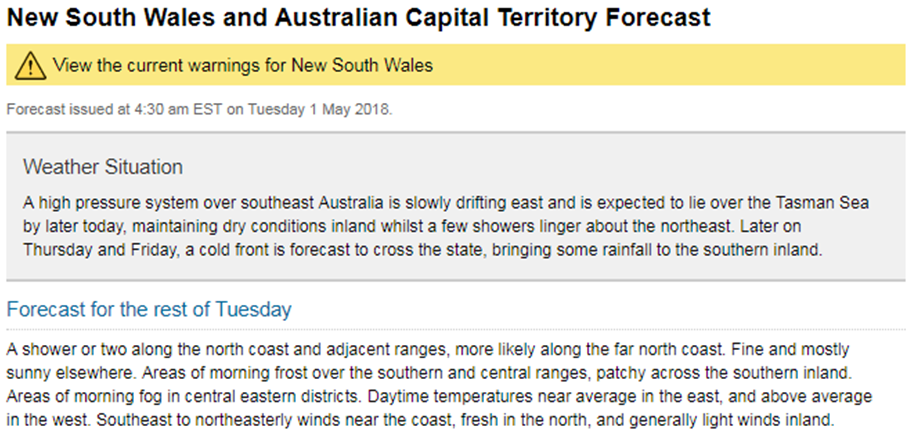
Image: An example of a State Forecast
Quick links to State/Territory Forecasts
|
Ø NSW/ACT |
Ø SA |
|
Ø Vic. |
Ø Tas. |
|
Ø Qld |
Ø NT |
|
Ø WA |
District Forecasts
Each State and Territory (except the ACT) is divided into several 'forecast district' areas. Where possible, the boundaries of districts are chosen to encompass areas with similar meteorological conditions. Nonetheless, most districts span a large area, and there will always be variation in their conditions (for example, inland vs along the coast). You may hear forecasters refer to these districts in the media as they are useful for describing how the weather will play out over the region that the radio or TV station broadcasts to.
It's essential to know your forecast district as they're the regions you'll see in our weather warnings. To find out which district you're in, check the maps at the quick links to District Forecasts in your State/Territory below, or toggle on the 'Forecast districts' below the map in MetEye to show the brown district boundaries.
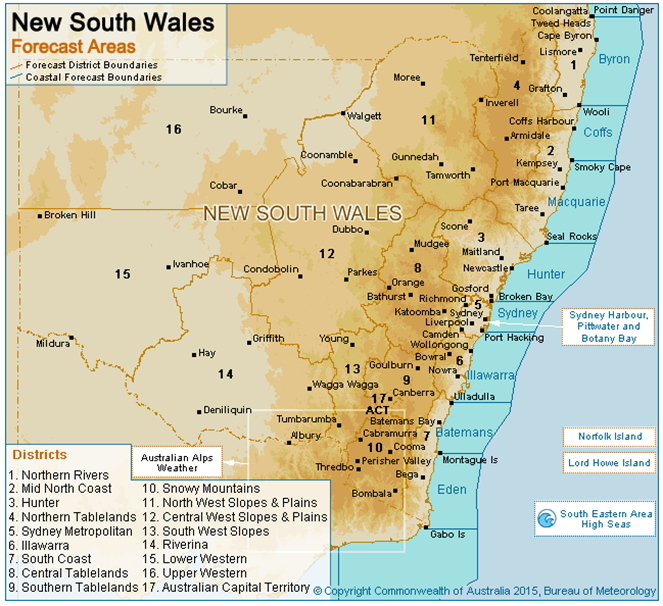
Image: An example of a District Forecast
Quick links to District Forecasts
|
Ø NSW/ACT |
Ø SA |
|
Ø Vic. |
Ø Tas. |
|
Ø Qld |
Ø NT |
|
Ø WA |
Local Forecasts, Town and Précis Forecasts
While they cover a smaller area than District Forecasts, Local Areas forecasts also describe the variation in weather across an area. They include major metropolitan centres (capital cities) and significant tourist areas. You can find maps showing the local forecast areas under 'Other Information' after selecting your state from the blue bar at the top of our website.
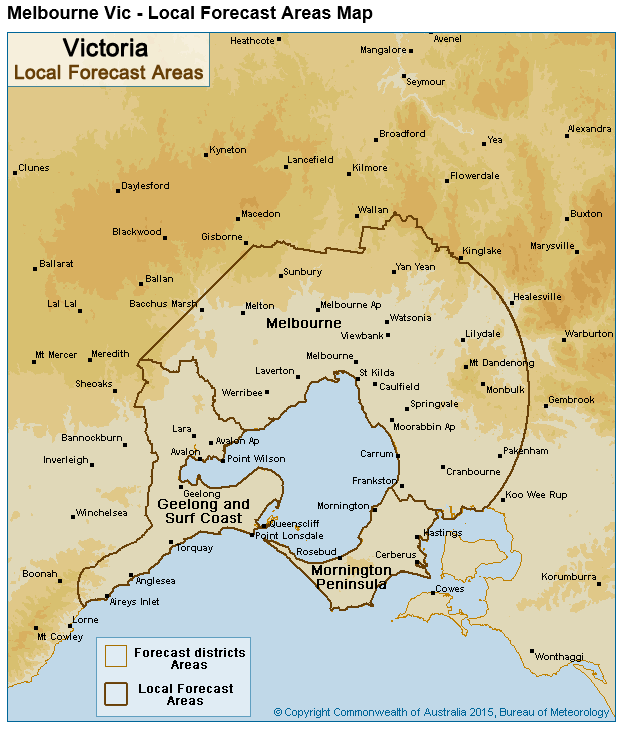
Image: Melbourne Local Forecast Area map
Outside of the local forecast areas, major regional centres have 'town forecasts' which, along with local forecasts are specific and detailed, and include the forecast weather for the week ahead.
A concise, summary forecast known a 'précis' forecast (French for precise), no more than 30 characters long and often displayed with an accompanying weather icon, is given for many locations. These include regional centres and some suburbs within major metropolitan centres.
Image: BOM Weather app showing a précis forecast, weather icon and local area forecast. The chance of rain at Noosa Heads is 30%, but averages to 20% across the Sunshine Coast area.
Quick links to town forecasts
|
Ø NSW/ACT |
Ø SA |
|
Ø Vic. |
Ø Tas. |
|
Ø Qld |
Ø NT |
|
Ø WA |
Coastal and Local Waters Forecasts
These are dedicated marine forecasts that include information on wind, weather, sea and swell. It's vital that boaters and other coastal users check these forecasts, rather than land-based forecasts, to make decisions for activities on the water.
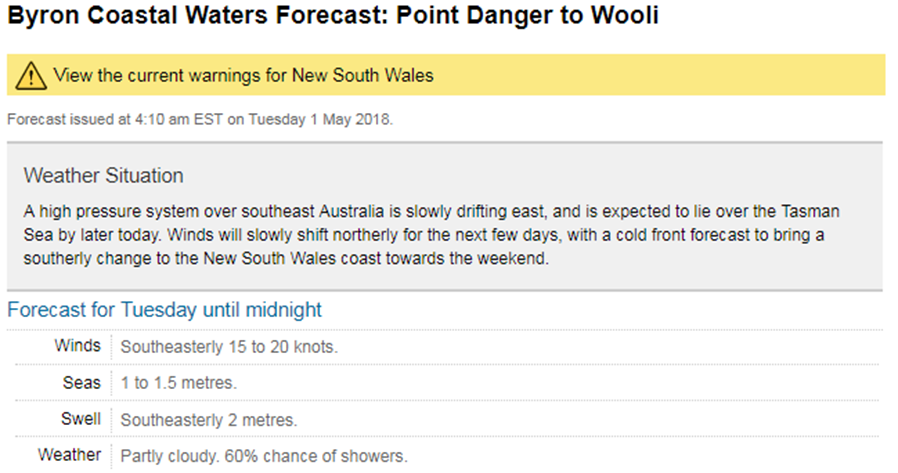
Image: An example of a coastal waters forecast
Quick links to coastal and local waters forecasts
|
Ø NSW/ACT |
Ø SA |
|
Ø Vic. |
Ø Tas. |
|
Ø Qld |
Ø NT |
|
Ø WA |
Forecasts for every location
For all locations within Australia, we provide key weather information for the upcoming seven days—temperature, rainfall and wind forecasts, and the weather icon via the MetEye online tool. You can also access it here, or on the BOM Weather app.
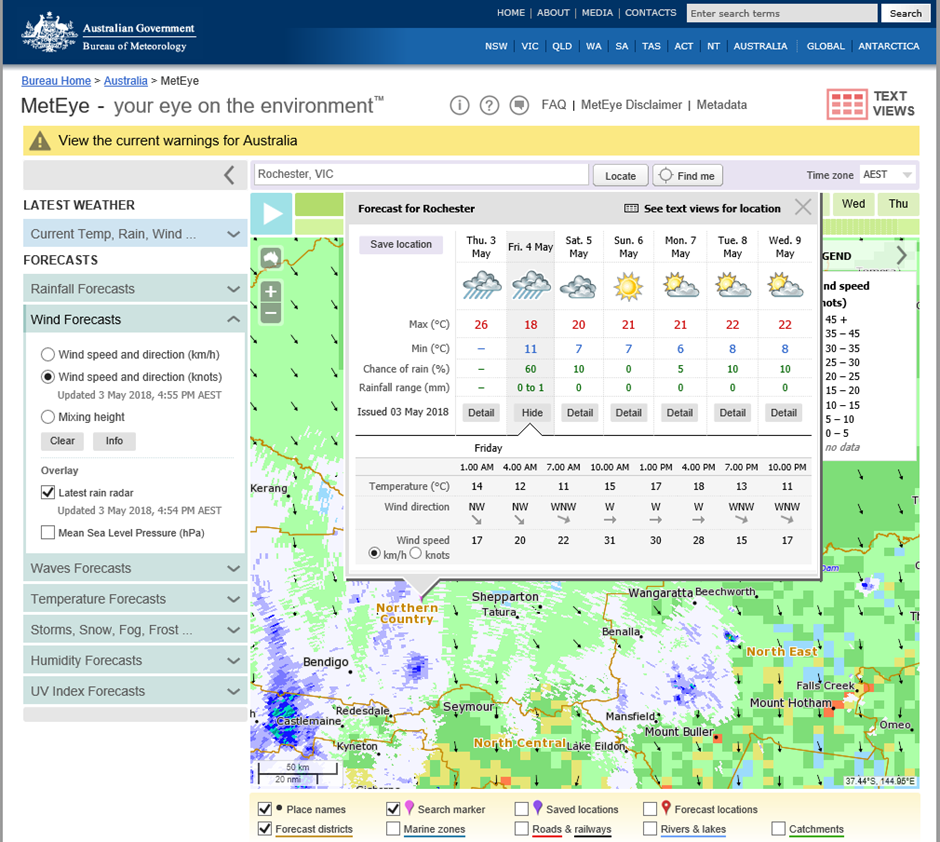
Image: Example of a map-based forecast in MetEye
Quick links to forecasts in MetEye
|
Ø NSW/ACT |
Ø SA |
|
Ø Vic. |
Ø Tas |
|
Ø Qld |
Ø NT |
|
Ø WA |
More information
Ten tips for a more detailed weather forecast
Right as rain: How to interpret the daily rainfall forecast
Clearing up the ‘patchy rain’: introducing a more precise forecast language


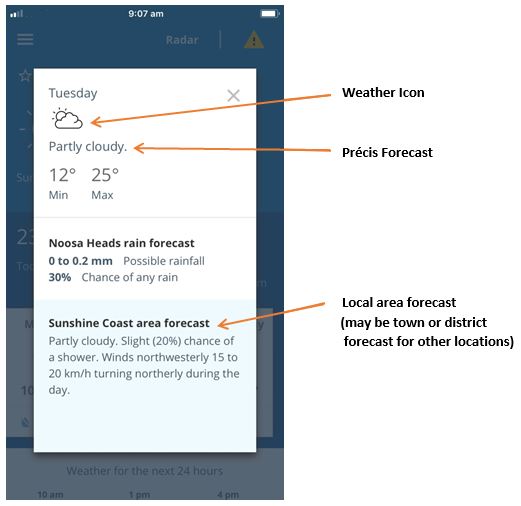
Comment. Tell us what you think of this article.
Share. Tell others.